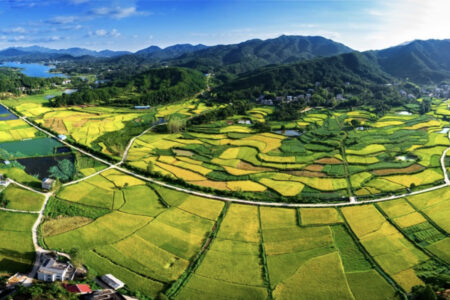MANILA — The Asian Development Bank (ADB) has approved a $200 million equivalent loan to strengthen the ecosystem, livelihoods, and climate resilience of the Dabie Mountain region in Huanggang Municipality, Hubei Province in the People’s Republic of China (PRC).
“The Hubei Huanggang Dabie Mountain Ecosystem Protection and Carbon-Neutral Green Development Project will support sustainable ecosystem protection and low-carbon resilient development,” said ADB Senior Water Resources Specialist Xueliang Cai. “The project will demonstrate the viability of ‘ecosystem protection as a business’ model to broaden financing opportunities for ecosystem conservation and sustainable development.”
The Dabie Mountain region has dense forest cover, extensive water networks, and rich biodiversity. However, compared with provincial and national average, it lags in socioeconomic development and faces deteriorating environmental quality due to intensive resource use. Public services in key areas including water utilities and flood and drought risk management are inadequate. The government has invested heavily in ecosystem protection but is yet to find long-term viable revenue-generating solutions for continued financing.
The project will work with the government to strengthen institutions for natural resources management and green financing capacity. This includes integrated digital management systems; policy development and capacity building, with pilot in natural capital accounting and value realization mechanism; and business opportunities development in related fields. It will help scale up a result-based eco-compensation mechanism in the Bailian River to facilitate upstream-downstream cooperation in water quality management.
Advanced technologies and nature-based solutions to help improve water resources management, flood protection, and wastewater and solid waste management will be mainstreamed by the project. It will restore forests, wetlands, and lake systems. The project will also develop irrigation infrastructure, agri-processing plants, and eco-tourism facilities, while achieving net-zero emissions during project operations.
The total project cost is $411 million, with $137 million in cofinancing from the Agricultural Development Bank of China and $74 million counterpart financing from the government. The climate change mitigation and adaption costs are estimated to be $260 million. The project duration is 6 years, and it has dedicated activities to share experiences and lessons across the PRC and regionally with ADB developing member countries.
ADB is committed to achieving a prosperous, inclusive, resilient, and sustainable Asia and the Pacific, while sustaining its efforts to eradicate extreme poverty. Established in 1966, it is owned by 68 members—49 from the region.

